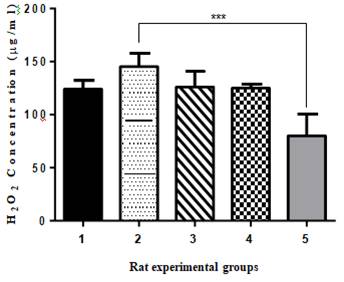Abstract
This study was conducted to assess the protective and treatment effects of Cassia alata aqueous extract against acetaminophen-induced nephrotoxicity. 25 Sprague-Dawley rats were equally divided into 5 groups; (1) Healthy rats (negative control); (2) Rats induced with acetaminophen toxicity (3000 mg/kg) as the positive pathological control; (3) Rats treated with Cassia alata (200 mg/kg, 21 days) and subsequently induced with acetaminophen toxicity (3000 mg/kg); (4) Rats induced with acetaminophen toxicity and subsequently treated with Cassia alata (200 mg/kg, 21 days); and (5) Rats supplemented with Cassia alata only for 21 days. Following completion of the treatment protocol, rats were sacrificed to harvest kidney organs. Kidney homogenate was subjected to oxidative stress biochemical parameters; malondialdehyde (MDA) content, catalase (CAT) enzyme activity and 1-1-di- phenyl-2-picrylhydrazyl (DPPH) radical scavenging activity. MDA content in groups treated with Cassia alata were all lower compared to the acetaminophen-induced group. Significant differences (p<0.05) were observed between acetaminophen-induced rats pre-treated with Cassia alata and Cassia alata supplementation only compared to positive control. CAT activity for all other Cassia alata treatment groups were comparable to healthy rats (p>0.05). Total antioxidant DPPH radical scavenging activity was also lowest in the acetaminophen-induced group compared to healthy rats and all Cassia alata treatment groups although the results were insignificant (p>0.05). Findings of this study suggest that Cassia alata aqueous extract (200 mg/kg) possess moderate protective and treatment effects against renal oxidative stress induced by acetaminophen-toxicity.
Full text article
Generated from XML file
Authors
Izuddin Fahmy Abu, Aina Akmal Mohd Noor, Anis Dzulaikha Zulkifli, Nabihah Abdullah, Norsham Juliana, & Muhammad Fattah Fazel. (2023). Alleviation of renal oxidative stress by Cassia alata in acetaminophen - induced nephrotoxic rats. International Journal of Research in Pharmaceutical Sciences, 9((SPL 2), 44–50. Retrieved from https://ijrps.com/home/article/view/4510
Copyright (c) 2018 International Journal of Research in Pharmaceutical Sciences

This work is licensed under a Creative Commons Attribution-NonCommercial-NoDerivatives 4.0 International License.

